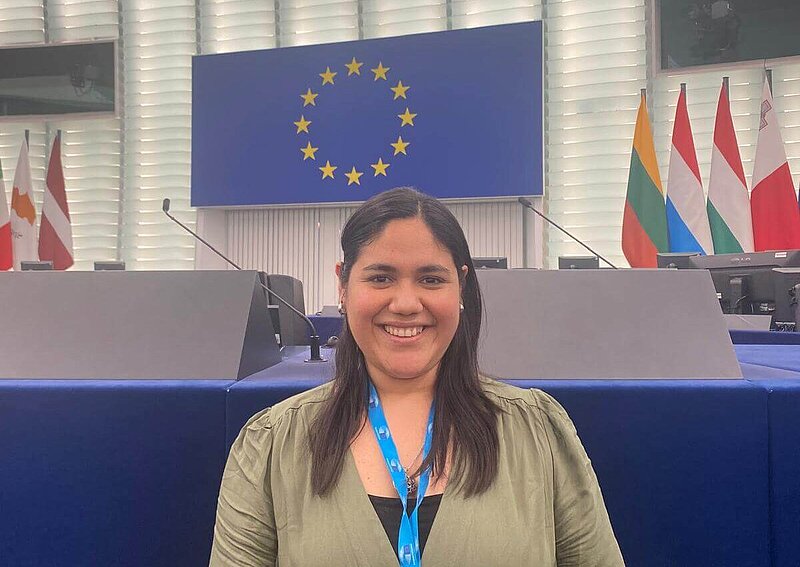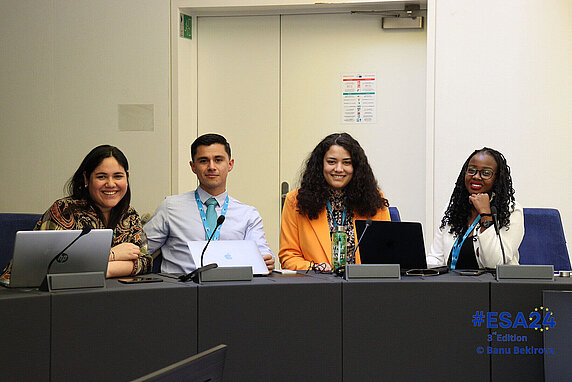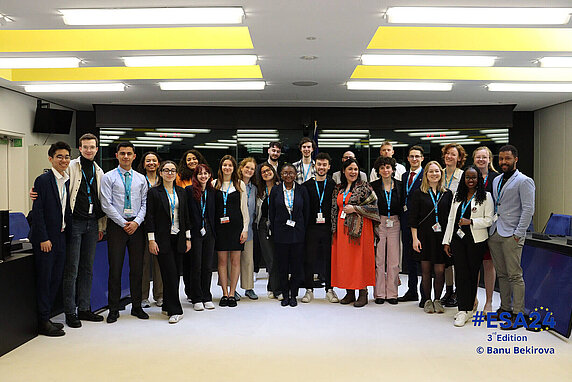
Ximena Docarmo reflects on political education after participating in the European Student Assembly in Strasbourg.
From 12 to 14 April, Ximena Docarmo, second-year Master of Public Policy student at the Hertie School, was at the European Parliament in Strasbourg to take part in the European Student Assembly (ESA) as a delegate of the European University Alliance CIVICA. Organised by the EUC voices project, this year’s ESA brought together 250 students from 41 alliances and 170 universities in order to devise policy recommendations to shape Europe’s future. In an interview, Ximena talks about what she gained from the experience and why she remains optimistic.
What is your main takeaway after three days in Strasbourg?
My main takeaway was seeing in real life how important the commitment to democratic values are when doing politics. Throughout the process, everyone respected fair, unspoken rules, and this made it easier to move forward in the content and decisions.
Of course, it was not easy to have three days of political debates in a group of 59 nationalities(!) after almost three months of online preparation. We had passionate arguments about policies that we considered vital to people's lives. But in the end, we all won by acknowledging how difficult it is to prioritise certain political decisions when these impact people's lives.
Which panel did you participate in, and what kind of recommendations did you adopt?
My team, Panel 4, proposed border control recommendations. I come from Peru, so, I began by reflecting on the challenges that Europe and Latin America have in common and proposed discussing the situation of individuals who have gone missing in the Central Mediterranean in attempts to reach Europe. Although Europe has better capacities, there is still much to be done to prevent forced migration, stop organised crime, and, painfully, give dignified closure to the relatives of those who have tragically died while migrating in unsafe conditions.
You are particularly interested in the topic of political engagement. Do you think that this type of event can contribute to increasing political engagement among young people and participation in the upcoming European Parliament elections?
Absolutely! Lifelong learning strategies with a focus on political education are key to ensuring that people are politically autonomous. This autonomy enables them to make decisions according to their political preferences. So, continuing political education throughout your life is fundamental to your political engagement.
I firmly believe that we need to do political leadership differently, and this is something I work on daily as Learning Designer at the Apolitical Foundation. We need to cultivate people's critical thinking, and we need to understand how social norms impact people's political decisions. These kinds of initiatives contribute to identifying new practices we want to see in politics, training new political leaders, and inviting more individuals to take the leap into the political arena.
As a student from Latin America, what is your perspective on the future of the EU?
The amazing Latin American people standing up for democracy have helped me to remain optimistic, so, I look at the future of Europe with honest optimism. Having said that, optimism helps us to define our future, but reality gives us a starting point.
For me, one of these starting points is the weakening of democratic systems globally. In Europe in particular, for a long time democracy was taken for granted. In recent years, both disinformation and populism have become real threats, even in the most democratic societies. The optimism that guides me is that in Europe, I see a constant call to action to protect what has taken decades to build in terms of security and peace.
Could you share your favourite moment from the European Student Assembly?
All of them! But especially the small conversations about democracy and politics. I am about to present my thesis on the Cycle of Political Engagement, so it was great that I could discuss my results and gain useful insights from young European politicians.
I would like to invite the Hertie School student community to apply for the upcoming ESA, especially those who are curious about politics. I am sure you will gain so much from this experience!
CIVICA – The European University of Social Sciences brings together ten leading European higher education institutions in the social sciences. CIVICA aims to build an inter-university campus that provides joint and long-lasting opportunities in teaching, research and innovative learning, while enhancing academic excellence and facilitating civic engagement in Europe and beyond. CIVICA was selected by the European Commission as one of the pilot European Universities in 2019 and confirmed as successful alliance in 2022 for its full roll-out under the Erasmus+ programme. Read more on civica.eu.
The Hertie School is not responsible for any contents linked or referred to from these pages. Views expressed by the author/interviewee may not necessarily reflect the views and values of the Hertie School.


